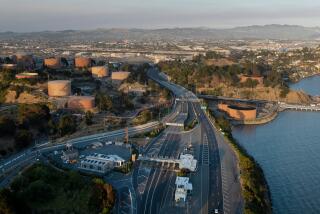Chevron’s second-quarter profit triples
- Share via
Chevron Corp. continued what has been a very big week for most of the world’s super-sized oil companies, shattering analyst expectations and tripling its second-quarter profit to $5.4 billion compared with a year earlier.
The industry’s pumped-up profit provides a fresh target for public anguish over the Gulf of Mexico oil spill, which has fouled beaches in five states since the deadly April 20 explosion of a rig drilling a well for London oil giant BP.
“They are thriving when a lot of families are out there suffering,” said Tyson Slocum, director of Public Citizen’s energy program.
In light of oil companies’ latest round of moneymaking, the recent $1-billion commitment made by Chevron, Exxon Mobil Corp., ConocoPhillips and Royal Dutch Shell to a rapid-response oil disaster team is “a bad joke,” Slocum said. “It would take at least $5 billion to have a real response unit with the right technical training and equipment.”
San Ramon, Calif.-based Chevron got a boost in its exploration and production business, known in the industry as “upstream” operations, from higher oil and natural gas prices and improved output. Chevron’s refining and marketing section, or “downstream” operations, added a substantial kick to earnings after performing so poorly last year that the company decided to cut its workforce in that segment.
“We had another very successful quarter — both operationally and financially,” Chairman and Chief Executive John Watson said in a statement Friday. “Current-quarter earnings from upstream operations benefited significantly from higher prices for crude oil and natural gas and higher net oil-equivalent production.”
All but one of the world’s giant oil conglomerates had similarly strong results.
Earlier this week, ExxonMobil said second-quarter profit soared to $7.6 billion, or $1.60 a share, from $4 billion, or 81 cents, in the same period a year earlier. ConocoPhillips announced a profit of $4.2 billion, or $2.77 a share, up from $859 million, or 57 cents.
BP was on track to post a hefty profit but ended up reporting a net loss of $15 billion for the quarter because of huge costs associated with the gulf oil disaster.
Westwood-based Occidental Petroleum reported net income of $1.1 billion, or $1.31 a share, up 61% from earnings of $682 million, or 84 cents. Occidental sales climbed to $4.8 billion, up nearly 30% from $3.7 billion.
Among the major oil companies, Chevron was considered one of the most effective of the industry’s profit makers.
Phil Weiss, an energy analyst for Argus Research, said in a note to investors that that Chevron “has the strongest long-term production growth profile among the major integrated oil companies.” Weiss added that Chevron has been successful in following “a balanced strategy of growth through drilling and well-placed acquisitions; its strong record of exploration success also supports our positive view.”
The oil industry’s short-term future is clouded, other analysts warned. After the April explosion of the drilling rig, the industry is facing tougher regulations, closer oversight and significantly higher insurance and production costs.
Fadel Gheit, a senior energy analyst for Oppenheimer & Co., warned that the stronger market for refined petroleum products was unlikely to continue because of slower economic growth and weak demand.
“Global refining overcapacity is expected to exceed demand growth, which is likely to remain anemic because of slower economic growth, improved fuel efficiency and growing use of alternative energy sources, especially in transportation. It appears that the golden age of refining was no more than a brief period of unsustainable record-high profits caused by unusual circumstances,” Gheit said in a recent note to investors.
Chevron posted a second-quarter profit of $5.4 billion, or $2.70 a share — more than triple the $1.75 billion, or 87 cents, it earned a year earlier. It easily beat the estimate of analysts polled by Thomsen Reuters, who on average predicted $2.44 a share.
Chevron’s sales jumped to $51 billion, up 29% from $40 billion a year earlier. The company benefitted from oil prices that averaged $71 a barrel in the quarter, compared with $50 in last year’s second quarter. Chevron’s production increased by 8,000 barrels a day, or about 1%, to 708,000 barrels a day.
The moratorium on new deepwater drilling has halted two exploratory wells in the Gulf of Mexico and delayed plans for two more, but production for the year will be reduced by less than 10,000 barrels a day, Chevron said.
“The Gulf of Mexico and other deepwater basins remain very important in meeting the energy demands of the U.S. and the world,” Chevron Executive Vice President George Kirkland told investors and analysts in a conference call. “We believe the moratorium should be lifted, and we believe that deepwater drilling can be done safely and reliably.”
Chevron’s stock closed at $76.21, up 19 cents.
More to Read
Inside the business of entertainment
The Wide Shot brings you news, analysis and insights on everything from streaming wars to production — and what it all means for the future.
You may occasionally receive promotional content from the Los Angeles Times.











